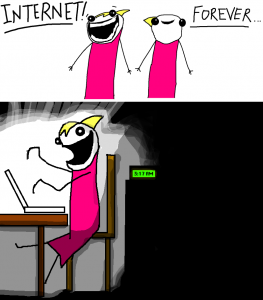Working.
Studying.
Those two things can feel so disparate sometimes. “The Academy” and everything beyond it can feel totally beyond reach from within the Scripps bubble. I had a kind of rough time freshman year finding my place at Scripps. Transferring from small-town breadbasket to (sort of) big-city liberal arts was not easy for me at first. I don’t think I realized how disoriented I felt (feel, sometimes) at Scripps until I came back here and found myself feeling more comfortable and grounded.
So whenever it would re-occur to me that I had to write an essay linking my on-the-ground, Midwestern, political experience with my radical, liberal arts, legal studies education so that I could get Scripps credit for my internship, I would freak out enough to push the whole thought from my mind for awhile.
And three months later, here I am, still struggling to find words to help me make the mental journey from here to my classes that start in two weeks.
I wish I could say that connecting my education to my summer job is easy. It isn’t. You may feel like you’re living your education when you’re pushing through a heavy round of midterms, but you’re not. You’re not actually living your education until you have to walk it and talk it in a room full of people who aren’t your professors or classmates.
You’re not actually living your education until a person’s path crosses yours one time, and one time only, and in the ten minutes you share together, the only thing you can tell them is that the law doesn’t require Veterans Affairs to provide them with health care benefits they know they earned during their service.
It’s hard to connect what I’ve learned at school to what I’m doing at work not because my education isn’t relevant or because my home state is some utopia far removed from the stuff I’ve learned in my classes. I think it’s hard because when you’re examining something “in theory” and from a distance–and this goes for any subject, I think, not just the humanities–you get a bird’s-eye view of a problem. But when you’re out in the world, you’re not granted that perspective. It’s easy to examine bacteria in a petri dish when you’re looking through the microscope. It’s totally different when you’re living and working in the petri dish and are trying to make acquaintances with the other bacteria. Looking at a problem in a controlled environment is so much different than looking a person in the eye. And I struggle to incorporate the complexities of my education into the unique situations I encounter every day.
But that doesn’t mean it’s impossible. When I was first starting my tutoring job on campus, the hardest part was knowing the right questions to ask and the most helpful (and realistic) advice to give. After probably a year of tutoring, I realized that my response to each situation came from the same mold but carefully tailored to each new person and her essay. I’ve had to do the same thing as I learned to collaborate with the staff at the Scripps newspaper. I’ve had to do the same thing as I learned to take disgruntled constituents’ phone calls this summer.
So I guess what I’m saying is that it takes more time and more careful thinking to incorporate your education into your every day life than most people (including me) ever realize. It requires experimenting, adjusting, and continued learning. If there’s anything I’ve learned in my legal studies classes, it’s that the law is heavy and onerous and at the mercy of the whims and shortcomings of everyone who touches it. That much I can say without a doubt has been true. But I’ve struggled with knowing what to do with this information.
This is probably why my career prospects are all over the place. You don’t really get a ton of guidance in this area in the classroom, but that’s because it’s unique to each person, and it’s something you just have to learn as you move about in the world after college. That’s really, really daunting. A career in sheep herding is sounding pretty great right now.
I always struggle with coming up with an ending for things that I write, probably because the way I write and think always produces more questions than answers. I always feel like I need to impart some important piece of wisdom to tie it all together (thanks, 8th grade English), but rarely do I have that kind of clarity. I told a good friend who reads this blog that I sometimes feel like I should have a huge banner above each of my posts that says “DISCLAIMER: I HAVE NO IDEA WHAT I’M TALKING ABOUT.”

Full disclosure: I’m lost inside and outside of the petri dish.
This summer has been such an experience. I’ve learned a lot about politics and what (good) legislators actually do, certainly, but I’ve also learned a lot about myself and what I expect from myself going forward. This summer has reinforced one of the biggest lessons I’ve learned at Scripps: it’s okay to not know what I don’t know. I hate to leave you with that, but this work in progress has a lot more learning to do.
Thanks so much for putting up with my ramblings all summer. Take care, and good luck!
All the best,
Em








